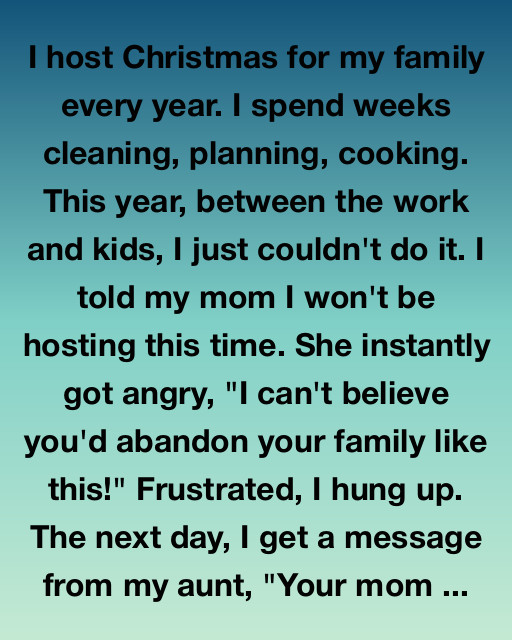I host Christmas every year. I clean for weeks, plan menus, map out oven schedules, and wear a permanent dusting of flour by mid-December. This year, between my full-time job, the kids’ school chaos, and the house never staying clean for more than ten minutes, I hit a wall. I called my mom and said, as calmly as I could, that I wouldn’t be hosting.
She didn’t take a breath before snapping, “I can’t believe you’d abandon your family like this!” I felt the old heat rise in my chest—the one I get when I’m treated like the family cruise director instead of a person—so I ended the call before I said something I couldn’t take back.
The next morning my aunt texted: “Your mom’s telling everyone you’re ruining Christmas on purpose.” I stared at the screen, annoyed and suddenly tired down to the bone. I hadn’t ruined anything. I was just asking to stop sprinting. Christmas isn’t supposed to feel like a second job.
I turned off my phone and took the kids to the park. The air was cold enough to see our breath, but the sun was kind. Nora tugged on my sleeve and asked, “Are we still having Christmas?” I kissed her forehead. “Of course. Maybe smaller this time.”
That evening, I turned my phone back on to a stack of missed calls and messages—my mother, my cousin Lisa, my brother three states away, all undoubtedly deputized into a group intervention. Instead of answering, I poured a glass of wine and sat with the glow of the tree, letting the quiet do its work.
The following morning I called Lisa first. “Your mom’s on a warpath,” she said. “I figured,” I sighed. “I just can’t do it this year.” She was quiet for half a beat. “Then let me. I’ll host.” I blinked. “You sure?” She laughed. “I have the space, and honestly… it might even be fun. We can shake things up.”
I felt a knot loosen. “What about my mom?” “She’ll get over it,” Lisa said. “Or she won’t. Either way, you deserve a break.”
Lisa moved fast. She sent a group text with a potluck sign-up, delegated decorations, and called it a “team effort.” A handful of relatives were supportive. A handful were not. My mother didn’t call at all, which was so unlike her it made me uneasy. I half expected her to appear on my porch with a fruitcake and a lecture.
On December 22, she knocked. She looked smaller than I remembered, tired in a way I couldn’t name. “I was in the neighborhood,” she said, which was a lie, but I let her in. The kids were on the couch watching a Christmas movie; for a moment, it softened the room.
“I didn’t mean to upset you,” I said. “I’m overwhelmed.” She sat at the edge of the couch, hands folded. “I thought you were being lazy.” I lifted an eyebrow. “Appreciate the vote of confidence.” She winced. “I said I thought that. Lisa told me what you’ve been juggling. I didn’t know.” “I told you I was tired.” “You didn’t tell me how much.” I considered that. “Would it have mattered?” She stared at her hands. “Maybe not. That’s on me.”
We sat in the quiet for a moment. “Christmas has always been how I show love,” she said at last. “Bringing everyone together. Making it perfect.” “It’s not perfect,” I said evenly, “if I’m crying in the bathroom and you’re calling the turkey ‘a little dry’ four years running.” Her mouth twitched. “I may have said that.” “You did.” She exhaled, long and slow. “It wasn’t fair. I see that now.”
She stood. “Lisa asked if I’d help this year. I think I will.” “You’re not mad anymore?” “I was. But I think it’s time I helped more and expected less.” She hesitated, then smiled. “Can I bring my cranberry pie?” “Only if you retire ‘world-famous.’” We both laughed.
Christmas morning was the first in years I didn’t wake up before dawn to baste anything. I stayed in pajamas until eleven, played board games with the kids, drank coffee while it was still hot, and didn’t vacuum a single baseboard. When we arrived at Lisa’s, the house glowed—twinkle lights, low music, that warm hum of happy people. My mother stood in an apron, pulling a pie from the oven. She waved me in like I was a guest of honor. “You made it!” “Wouldn’t miss it,” I said, and meant it.
Lisa was a natural—organized without being rigid, generous without martyrdom. The day flowed. People talked to one another instead of orbiting me with questions. I ate while the food was hot. I sat. I watched my kids laugh with their cousins. I felt present.
After dinner, Lisa clinked a glass. “This year’s been… different,” she said, smiling at me. “But I think it’s been healing. Traditions aren’t about who hosts or how perfect the napkins are folded. They’re about showing up.” My mother wiped a tear and squeezed my hand under the table. “She’s right,” she whispered.
That night, after pajamas and tooth-brushing and Nora whispering, “Can Aunt Lisa do it every year?” I tucked blankets around small shoulders and turned out the light. My phone buzzed. A message from my mom: Thank you for standing your ground. You taught me something this year. Love you.
It turns out the world doesn’t end when you say no. Sometimes it begins again. Boundaries aren’t a rejection of love; they’re an invitation to share it. Christmas didn’t collapse without me at the helm. It widened—made room for other hands, other recipes, other ways of showing up.
I’ll host again someday, maybe. Or we’ll rotate. Or Grandma will insist on her turn and we’ll all endure the “world-famous” pie with good humor. But now I know this: love isn’t measured in how much you sacrifice. Sometimes it looks like rest, honesty, and letting other people step in.
And if you need the reminder—no isn’t selfish. It’s a door. Sometimes, on the other side, is exactly the kind of holiday you’ve been missing.


